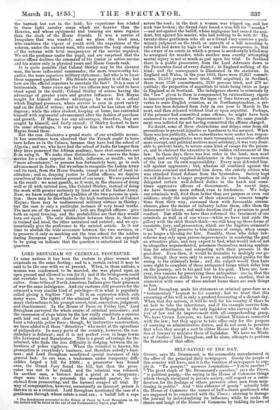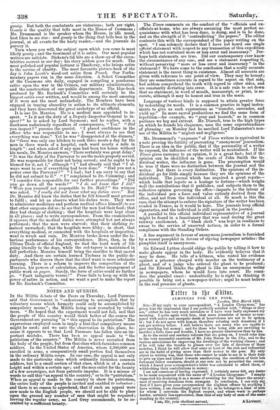SELF-SATIRE OF THE DIY.
GOSSIP, says Mr. Drummond, is the commodity manufactured in the office of the principal daily newspapers. Gossip the people of this country will have, and it is the vocation of newspapers to sup- ply it. " Tu quoque!" answers Journalism—" You're another ! " The great staple of Mr. Drummond's speeches," says the Times, "is political gossip,—the saying in the House of Commons things which though circulated in private society, self-respect or a consi- deration for the feelings of others prevents other men from men- tioning in public." And "this abhorrer of gossip" actually tells the House of Commons the names of half-a-dozen gentlemen who are supposed to be connected with the Times ; striving to damage the journal by individualizing its influence, while he seeks the cheers and laugh of the llouse of Commons by tickling its love of gossip. But both the combatants are victorious; both are right. Gossip is the quality that tells most in the House of Commons ; Mr. Drummond is the speaker whom the House' in idle mood, best likes to see rise: and gossip is the thing that tells best in the journal, at all events for the hasty reader,—and the journals do purvey it. Turn where you will, the subject upon which you come is most likely gossip ' • and the 'treatment of it is satire. Our most popular writers are satirists. Dickens's tid bits are a show-up of the eccen- tricities current in our day; his story seldom goes for much. The most polished and popular lecturer is Thackeray, who brings satire to the service of charity. The most favourite picture-book of the day is John Leech's wood-cut satire from Punch. Our Parlia- mentary papers run in the same direction. A Select Committee of the Commons sits daily, engaged in compiling a ponderous satire upon the war in the Crimea, our military administration, and the construction of our public departments. The blue-book produced by Mr. Roebuck's Committee will certainly be the biggest satire ever written, and would be among the most amusing if it were not the most melancholy. The Members have been engaged in tracing absurdity in action to its ultimate elements, and they have discovered the great archetype of an official. It is one Dr. Menzies. He is a medical man appointed to in- spect. "Is it not the duty of a Deputy-Inspector-General to in- spect ?" he is asked by Lord Seymour; and he replies, with a frankness audaciously regardless of consequences, "Yes." "Did you inspect P" pursues the querist. "I placed confidence in the officer who was responsible to me ; I went always to see that everything was done." Yet he was "disappointed at the dinners," for "there was only one kitchen to cook three meals a day for the men in three wards of a hospital, each ward nearly a mile in length ": and when asked if any man had been ten hours without his meals, Dr. Menzies answers, "There certainly was great delay." "It was the duty of the Purveyor to see the meals properly served. He was responsible for their not being served ; and he ought to be blamed for it, not I," although " I " had already said that "I al- ways went to see if everything had been done.' "Had you not a power over the Purveyor ? " "I had; but I am sorry to say that he did not submit to it." "I" complained to Dr. Cumming ; and "I consider him responsible for any further proceedings." "Did you go down all the wards ?" "I do not know that I did." "Were you yourself not responsible to Dr. Hall?" the witness was asked. "I really did not know what my duties were." But Dr. Menzies did know the duties that he felt himself most pressed to-fulfil; and let us observe what his duties were. They were to administer medicines and perform medical offices himself; to see that other surgeons did so ; to see that the men had their food; that they had change of clothing ; that the hospitals were kept clean in all places; • and to write correspondence. From the examination it appears that the medical duties were attempted but not always performed ; that the men were starved; that their clothing re- mained unwashed; that the hospitals were filthy ; in short, that everything medical, or connected with the hospitals or inspection, went to wreck and ruin. Dr. Menzies broke down under the la- borious performance of his correspondence. Here, then, in the Ultima Thule of official England, we find the hard work of life going literally to the dogs, while the red-tapery is maintained in full perfection ; Menzies himself being the sacrifice to that sacred duty. And there are certain learned Thebans in the public de- partments who discern there that the chief want is more scholastic learning. There is a reform to improve the composition of the Menzies, his powers of calculation, and the better arrangement of public work on paper. Surely, the force of satire could no further go. "Faoit indignatio versus!" Prose fails to keep up with the power of satire in action, and we want a poet to make the report for Mr. Roebuck's Committee.



























 Previous page
Previous page